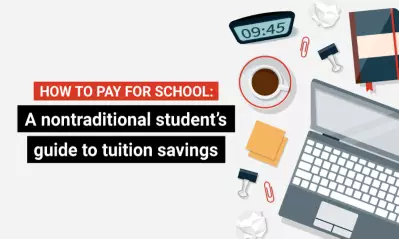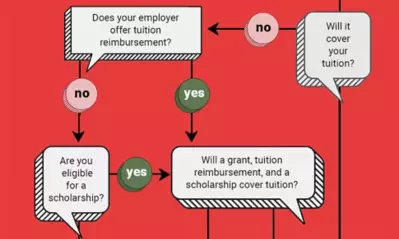What is tuition assistance?
This article was updated on April 15, 2024.

Written by Laurie Davies

Reviewed by Bronson Ledbetter, MBA, Vice President, Student Services and Financial Operations

In today’s financial world, any assistance with tuition is a thing of beauty. But when it comes to actual “tuition assistance” (and what it means when those two words are used together), did you know that your employer might help do some of the heavy lifting?
Whether your employer is a bank, a bookstore or a coffee shop, it might offer a tuition assistance (or tuition reimbursement) program through which it helps cover the cost of higher education for employees.
More companies are offering tuition assistance as a way to invest in their employees as well as recruit and retain them. In 2021, Amazon announced it would cover the cost of college tuition, books and fees for its 750,000 U.S. employees. These days, many midsize and large employers, including Target and Home Depot, help cover at least some of the cost of tuition for eligible employees.
Employers may find tuition assistance programs an attractive option for closing the skills gap in their workforce and improving employee retention. For eligible employees, meanwhile, it can be a cost-effective way to earn a degree.
How does tuition assistance work?
In most tuition assistance programs, a student will pay the cost of tuition and fees up front. Then, after a semester or course is complete, their employer reimburses them according to the terms of the company’s program.
As with any employer program, the employer gets to set the rules. It’s important to read the fine print before you jump in.
For example, some employers pay only up to a certain dollar amount each year. Others make reimbursement contingent on grades, with some employers even using a sliding reimbursement scale based on letter grade performance (e.g., full reimbursement for A’s, 80% for B’s, 60% for C’s, zero for D or F grades).
In some companies, tuition assistance rates vary by position and employment status.
Obviously, employers want to safeguard against paying an employee’s higher education costs only to watch that employee resign before the ink on their diploma is dry. Thus, you may be required to remain at the company for a set period or reimburse the company for part of the tuition assistance if you leave before the period’s up.
Is tuition assistance taxable?
In general, the IRS says tuition assistance may be taxed for educational benefits over $5,250. This is a tax the employer would pay, but there are some exceptions.
So, the question “Is tuition assistance taxable?” can get a little complicated. It’s always a good idea to consult with a tax professional about possible tax implications you may face as a recipient of tuition reimbursement.
Tuition assistance vs. tuition reimbursement
If you’ve seen the term “tuition reimbursement” and thought it was the same thing as tuition assistance, think again.
Tuition assistance refers to certain financial help with the costs of a course or program. In some tuition assistance programs, employers might pay tuition fees and costs to the institution directly. This can reduce paperwork for employees and means they don’t need to wait to be paid back for tuition costs.
Tuition reimbursement, on the other hand, indicates the employee pays for tuition-related fees directly and is reimbursed by the employer later. Each employer has its own set of criteria to issue reimbursement, and the employee needs to be able to cover the costs up front.
Both tuition assistance and tuition reimbursement can be attractive to employees looking to upskill and learn.
Tuition benefits: What to consider
Like health insurance and a 401(k), tuition benefits, when offered, can be considered part of your total compensation package. When you look at it that way, not taking advantage of it means you’re leaving money on the table.
If you’re job hunting and would like a position with an employer who offers tuition benefits, it can be difficult to ask about it during an interview. You could contact the HR department to request a list of the company’s approved tuition assistance affiliates. Or wait for an official offer and ask about the details then.
Knowing which companies offer tuition assistance for their employees can help guide your job search. However, a company may only cover certain types of educational programs or only those available at certain institutions. While some cover any program you wish, others only cover classes or programs that relate to your role. If those programs don’t align with your professional goals, or attending the selected institutions isn’t feasible or practical, it may not make sense for you to take advantage of this benefit.
What is the military tuition assistance program?
There are certain tuition assistance programs that are designed for very specific industries or roles. The military’s tuition assistance (TA) program is a benefit available to active-duty service members of the U.S. Army, Navy, Marine Corps, Air Force, Space Force and Coast Guard. Each service has its own eligibility criteria, processes and requirements. Under the program, a significant portion of tuition expenses may be covered for undergraduate and graduate-level programs.
The Department of Veterans Affairs also offers education benefits to eligible veterans through the Post-9/11 GI Bill®, which may be available to qualifying dependents as well. In addition, active service members may be able to use funds under the GI Bill to pay for tuition expenses not covered under the TA program.
Perks of tuition benefits
Obviously, one of the biggest benefits of tuition assistance and reimbursement programs is that it can help make furthering your education and enhancing your skills affordable. But there are other advantages to consider.
For starters, taking advantage of your employer’s tuition assistance program can build your confidence. It allows you to demonstrate your dedication to professional development and taking on new challenges.
Some schools may offer additional benefits too. For example, employees of a company may be eligible for reduced tuition, making this benefit even more feasible.
How to get tuition assistance
With most employers, a good starting point for pursuing tuition assistance is the human resources department. An application for tuition assistance and a determination of your eligibility (and program selection) by your manager or supervisor may be needed to get the ball rolling. If you’re eligible and approved for tuition assistance, it’s time to find the school that aligns with your schedule and your employer’s parameters and enroll.
If you work for a smaller or midsize employer that doesn’t currently offer tuition assistance, it doesn’t hurt to ask them to add this benefit. You might be able to make a case for how the benefits of tuition assistance can give the employer an advantage in the long run.
GI Bill® is a registered trademark of the U.S. Department of Veterans Affairs (VA). More information about education benefits offered by the VA is available at the official U.S. government website at https://www.benefits.va.gov/gibill.

ABOUT THE AUTHOR
A journalist-turned-marketer, Laurie Davies has been writing since her high school advanced composition teacher told her she broke too many rules. She has worked with University of Phoenix since 2017, and currently splits her time between blogging and serving as lead writer on the University’s Academic Annual Report. Previously, she has written marketing content for MADD, Kaiser Permanente, Massage Envy, UPS, and other national brands. She lives in the Phoenix area with her husband and son, who is the best story she’s ever written.
This article has been vetted by University of Phoenix's editorial advisory committee.
Read more about our editorial process.
Read more articles like this:


